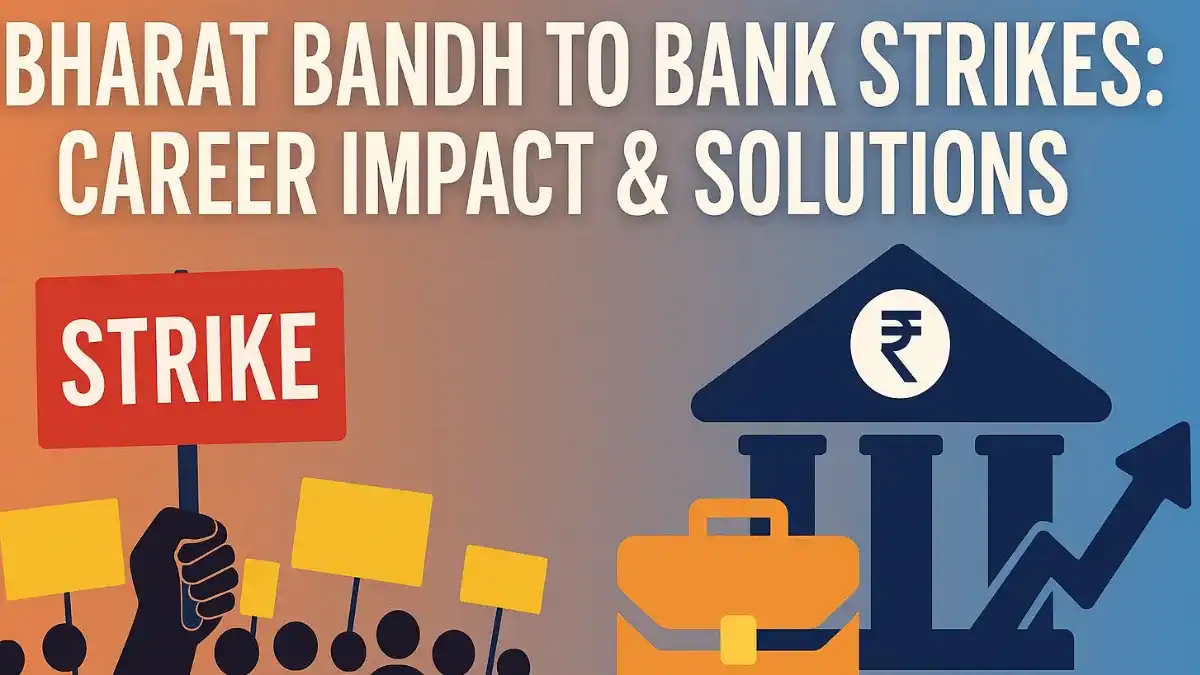Bharat Bandh to Bank Strikes Picture this: You’re sipping chai in your Bangalore apartment, ready to log into work, when frantic WhatsApp messages flood in – “No office today! Bharat Bandh!” Trains halt. Banks close. Your project deadline? In limbo. Across India, from Mumbai’s dabbawalas to Kerala’s shopkeepers, millions face this reality during strikes like the recent July 9th Bharat Bandh. If you’ve ever panicked about paychecks during a bank strike or missed interviews due to transport shutdowns, you know labour movements aren’t just headlines – they’re career earthquakes. But what if I told you understanding these events could actually make you a smarter, more resilient professional?
Why Your Salary Might Be on the Strike Agenda
Remember when Pune’s IT park went silent during the 2020 bank strike? Those weren’t just disgruntled employees – they were professionals fighting for realities you might face too. Strikes usually boil down to:
- The Paycheck Protest: Like Mumbai bank employees demanding inflation-linked wage revisions.
- Job Security Jitters: Assam tea plantation workers striking against abrupt layoffs.
- Workload Wars: Bengaluru delivery riders halting services over unrealistic targets.
Trade unions amplify these battles nationally. When you see “Bharat Bandh trade unions strike India” trending, it’s often about policy changes affecting your work-life balance – think new labour codes or pension schemes. Digital Smart Careers tracked how 78% of professionals feel anxious during strikes because they don’t see the personal connection. Pro tip: Follow union demands – they’re early warnings about industry-wide shifts.
When the Strike Hits Your Desk: Navigating Career Chaos
Rahul, a Hyderabad sales manager, missed a crucial client pitch during last year’s transport strike. His fix? He now uses strike periods strategically:
- Remote Work Readiness: Keep laptops charged and dongles handy. Cloud tools like Google Workspace saved Chennai IT teams during bandhs.
- The Emergency Fund: Aim for 3 months’ expenses. Strikes can delay salaries (yes, even in corporate jobs!).
- Skill Sprints: Use unexpected off-hours to learn. Rahul completed a digital marketing course during a 2-day bandh.
During the July 9 bank strike, Kolkata finance pros used downtime to analyze market trends. As Digital Smart Careers advises: “Turn disruption into upskilling opportunities.”
| Strike Type | Immediate Impact | Smart Career Move |
|---|---|---|
| Bank Strikes (like July 9) | Salary delays, loan processing halts | Diversify income (freelance gigs) |
| Transport Bandhs | Commute nightmares, missed meetings | Master virtual collaboration tools |
| All-India General Strikes | Project delays, supply chain chaos | Build cross-functional skills |
Strike-Proof Your Career in 4 Moves
Strikes reveal industry vulnerabilities. Here’s how to armor your career:
1. Become an Industry Weather Forecaster
Follow labour journalists on Twitter. Apps like LabourWatch send strike alerts. When “tomorrow strike in Kerala” trends, check if your suppliers/teams are affected.
2. Network Like Your Job Depends on It (It Does)
Delhi-based Priya landed a job referral during a bandh when she helped a stranded colleague. Join groups like Digital Smart Careers communities on LinkedIn – they share real-time job leads during disruptions.
3. Flex Your Flexibility Muscle
Companies now value adaptability. Volunteer for crisis projects post-strike. Mumbai ad agencies promoted employees who salvaged campaigns during bank strikes.
4. Diversify Like a Pro
Strikes expose over-reliance on one employer. Start a micro-consulting side hustle. Use platforms like Upwork or Internshala to find gigs immune to local disruptions.
From Bystander to Change-Maker: When to Join the Fight
Not all strikes are created equal. Ask:
- Does this align with my values? (e.g., gender pay gap protests)
- Will my participation create meaningful change?
- What’s the personal cost? (Reputation, job security)
Bangalore tech workers recently won WFH options after strategic protests. But consult mentors before marching. As Digital Smart Careers emphasizes: “Choose battles that advance your professional dignity long-term.”
Your Career Will Survive – And Thrive
Strikes feel like career roadblocks, but they’re really detour signs. They force us to question: “Am I truly resilient?” “Do I have backup plans?” Remember Ananya from Pune? She lost her retail job during a 6-month strike. Today, she runs a thriving e-commerce store. Labour movements remind us that careers aren’t linear – they’re journeys shaped by societal shifts. By staying informed, adaptable, and community-connected, you won’t just endure the next “all India strike” – you’ll emerge stronger. Now, go update that emergency fund and LinkedIn profile. Your smarter career starts today.
Your Strike Survival Toolkit
FAQs:
- Can I be fired for joining a strike? Depends on company policy and strike legality. Always check employment contracts.
- How do I know if a strike is confirmed? Follow credible sources like Labour Bureau updates or industry-specific unions.
- Should I discuss strikes at work? Stay neutral. Focus on solutions: “How can our team adapt?”
Must-Have Apps:
- MSeva: Government service alerts including strikes
- Splitwise: Track shared expenses if strikes disrupt pay
5 Quick Tips for Tomorrow:
- Bookmark your industry’s major union websites
- Save one hour’s pay weekly to a strike emergency fund
- Identify 3 remote-friendly tasks you can do offline
- Connect with 2 colleagues outside your department
- Subscribe to Digital Smart Careers for labour trend analysis






